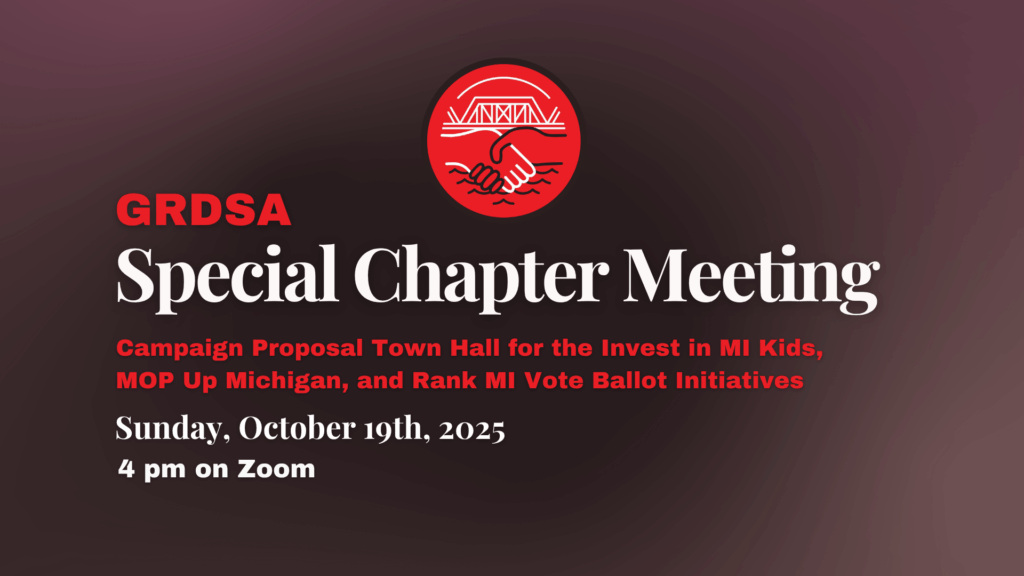

Organizing Greenbelt against fascism w/ Frankie Santos Fritz


Retail Rent: A Leech on Our Communities


Endorsement: Frankie Fritz, Greenbelt Mayor & City Council
DSA is proud to endorse Frankie Santos Fritz for Greenbelt Mayor & City Council!
Frankie is a longtime local organizer and branch leader with Metro DC DSA. He is a proud member of a union family and plans to introduce a collective bargaining ordinance to cover the city workforce. Frankie is also a member of the Greenbelt Home Inc housing co-op and is championing laws to empower tenants who wish to convert their communities to cooperative or social housing.
Frankie plans to expand rent stabilization protections to cap annual rent increases with the rate of inflation. He is dedicated to supporting federal workers who are under attack from DOGE and the federal administration. His top transportation priority for the next term would be getting the long-promised Capital Bikeshare station built at the Greenbelt Metro Station and getting it stocked with numerous E-Bikes.
Check out the rest of Frankie’s campaign priorities!

Who are our other candidates?
DSA’s Nationally-endorsed socialist candidates are running for local office in Washington, Minnesota, Colorado, Michigan, New York, New Jersey, Maryland, and Massachusetts!
Our candidates are incredible fighters for the working class, championing rent stabilization and higher minimum wages, while also protesting ICE’s human rights violations.
This year, we launched a rotating fundraising slate and held phonebanks to foster cross-chapter solidarity. And we’ve raised over $100,000!



Special Chapter Meeting: Campaign Proposal Town Hall

This is a special meeting of the GRDSA Chapter to consider a proposal to endorse and support several ballot initiatives.
We will have reps from each campaign to give a brief presentation and answer any questions. Then chapter members will present a proposal to endorse and circulate these petitions as a chapter.
Michigan for the Many (M4M) is an alliance between the MOP Up Michigan (Money Out of Politics) and the Invest in MI Kids (wealth tax to fund education).
Rank MI Vote (RMV) would amend the Michigan Constitution so that we would use Rank Choice Voting (instant runoff) for elections.
Join us Sunday, October 19, 4pm, on Zoom to hear how these initiatives can empower the working class of Michigan.
The post Special Chapter Meeting: Campaign Proposal Town Hall appeared first on Grand Rapids Democratic Socialists of America.


The Buzz of Beijing
The following article is the result of a visit to the People’s Republic of China to participate in celebrating China’s 80th Anniversary of its victory over Japanese fascism. Dee Knight and DSA China Working Group coordinator Anlin Wang were part of a five-person self-organized delegation of DSA members.
Beijing buzzed with excitement on September 3, as leaders of friendly countries poured into the city from around the world. They came to celebrate China’s 80th anniversary of defeating Japanese fascism in World War II and to participate in the Shanghai Cooperation Organization’s (SCO) Summit meeting. It was an impressive display of “unity in multi-polarity” featuring Russian President Putin and Indian Prime Minister Modi, as well as North Korean leader Kim Jong Un, among about two dozen others.
With participation of most southeast Asian members of ASEAN, as well as the “stans” of central Asia, China was literally surrounded by the representatives of countries representing well over four billion people and nearly half the world economy. Another prominent participant was President Pezeshkian of Iran, which maintains close economic and military partnerships with both Russia and China.
The New York Times called Beijing’s Victory Day parade on September 3 “a defiant warning to its rivals.” The awesome display of China’s military might at the V-Day parade lent “a menacing tone” for Western leaders and media. CNBC said Xi Jinping made “a thinly-veiled swipe at Trump’s global tariff campaign” when he said “shadows of Cold War mentality and bullying have not dissipated, with new challenges mounting.”
CNN offered a more measured tone, quoting Xi: “I look forward to working with all countries for a more just and equitable global governance system… We should continue to dismantle walls, not erect them; seek integration, not decoupling.” CNN added that “Xi’s vision pushes back against the foundations of a US-led world order, opposing alliances like NATO.”
Russian President Putin commented to Russian media after the summit that “The SCO is not designed to confront anyone. We do not set ourselves such a task. And… during the discussions and bilateral meetings, there has never been anything that could be described as a confrontational beginning during these four days.”
In kicking off the SCO Summit, Xi said “We should advocate an equal and orderly multipolar world, and a universally beneficial and inclusive economic globalization, and make the global governance system more just and equitable.”
How defiant is that? (Strange that advocating “universally beneficial and inclusive economic organization” can actually be considered a death threat for the US-led “rules-based” system.)
The massive military display at Beijing’s V-Day celebration left little doubt that China would never allow itself to be bullied again. More than 35 million Chinese were killed in Imperial Japan’s invasion and occupation of their country from the early 1930s to the end of World War II in August 1945. That’s even greater than the USSR’s loss of 27 million from the German Nazi onslaught. Together those numbers prompted Trump to say “Many Americans died in China’s quest for victory and glory. I hope they are rightfully honored…”
Through the summit, we can see the past and future in contention for a world that’s striving to break away from overwhelming U.S. domination and unipolar rule.
The “American Century”
The US lost about 420,000 soldiers in World War 2, according to the National WW2 Museum. But it assumed the role of overall victor, launching “the American Century” along with a global war against communism. It has maintained occupation troops in Japan, South Korea, the Philippines, Guam and other Pacific islands – all of which are deployed today against China, just as NATO (and its “defensive alliance” against the Soviet Union) continues to threaten Russia. Which side is threatening and destabilizing? It depends largely on your point of view.
During the Korean War, from 1950 to 53, the US slaughtered millions of Koreans, and flattened all buildings of more than one story, in a massive bombing campaign. Its threats to extend the war into China were repelled by the mobilization of half a million Chinese to fight alongside the North Koreans. The US war against Vietnam began shortly after the French colonizers were routed in 1954 and lasted until the US too was finally defeated in 1975, at a cost of additional millions of Vietnamese victims and tens of thousands of US troops. Some estimates put the total number of Vietnamese dying from the U.S. war there at over 3 million, a staggering amount of human loss. Both wars were also aimed at China, and China provided troops and weapons to support their allies in both, staving off further ruin and destabilization within their own territory.
The war zones of today, in Eastern Europe, West Asia and the Far East, are continuations of eighty years of US unipolar domination, both militarily and economically. But the way the US is protecting its interests in all three areas has exposed a blunt reality: the constant official refrain that “America is protecting democracy and human rights” is nothing but war propaganda and mythology. For most of the world’s population, America’s leadership has only meant invasion, coups and more death.
The US: Sponsor and Protector of Fascists
While China and the USSR achieved major defeats against fascism, the US sheltered and rehabilitated Imperial Japan’s fascist rulers, helping them form and maintain the country’s far-right Liberal Democratic Party which has ruled virtually non-stop for 80 years. (The US CIA did the same for the fascists of Ukraine, and have since sponsored them against Russia.) Japan’s rulers have been obstinate in acknowledging their role in the horrors their empire had perpetrated across Asia, refusing to apologize for slaughtering millions in their invasion and occupation of China. Ditto for Japan’s 35-year colonial hold on Korea, from 1910 to 1945. In both countries the Japanese imperialists were notorious for setting up systems of “comfort women” – sex slaves for Japan’s occupation forces (not very different from the hospitality enjoyed by US occupation forces across Asia today, but a significant contrast to the status of women in China today).
In South Korea, a country formed by Korean collaborators with the Japanese empire, the U.S. has sponsored a series of military dictatorships in South Korea, until democracy finally broke through in the 1990s. Such dictatorships were aimed at threatening China, most notably in the so-called Korean War, that resulted in an armistice in 1953 but never officially ended, which has kept Korea split in two and maintained a kleptocratic U.S. client state in power in the south for generations to come. In fact, through the armistice deal, the US working with its anticommunist counterparts in South Korea, awarded itself a forever military presence there, guaranteeing “operational control” of the massive Korean military in case of war against the Democratic People’s Republic of [North] Korea (DPRK), China, or both. Such belligerence underscores the significance of DPRK leader Kim standing next to Russian President Putin and Chinese President Xi at the V-Day event. It would seem that America’s network of alliances is now being faced with a counter-alliance of groups and nations no longer willing to accept its rule.
Even the internal politics of South Korea has been scrambled over the last few months. Its new president, Lee Jae Myung, came to power last June, following six months of intense popular struggle to oust the US puppet President Yoon, who was impeached and jailed after declaring martial law, and trying to provoke a war with US backing. When President Lee visited Trump in August, he resisted US pressure for him to join US escalation against China, which is South Korea’s number one trading partner.
The friendly leaders from around the world who joined both the SCO summit and the Beijing V-Day celebration showed that US efforts to surround and threaten China are failing. Most of the southeast Asian countries that make up ASEAN, notably Vietnam, Indonesia, Laos, Malaysia, Myanmar, Thailand, and Cambodia, attended after recent visits to their countries by Chinese President Xi. The significant exception was the Philippines, where the US maintains a military alliance aimed at China. But like in South Korea, the popular movement against US domination is strong, with serious efforts to force the US bases out, and to help US soldiers refuse to engage in a hopeless war that can only lead to needless suffering and death.
The American century, part two, is in a phase of serious reckoning, as China does what the U.S. has never done, which is build alliances rather than simply imposing its will on other nations.
Remembering When the US Helped China Against Fascism
The week before China’s national V-Day celebrations, there was a special event in the southwestern province of Guizhou, honoring doctors and nurses from the US and European countries who formed an International Medical Rescue Corps. As this Xinhua article reports, “Dozens of foreign medical workers worked alongside thousands of their Chinese counterparts from the Chinese Red Cross Medical Relief Corps to save lives and provide medical training under harsh conditions. Today, these foreign medical workers are collectively remembered as the International Medical Relief Corps (IMRC).”
On August 26, a delegation of the descendants of these volunteers attended a commemoration in Guiyang, the capital of Guizhou province, “to pay tribute to their forebears and mark the 80th anniversary of the victory in the Chinese People’s War of Resistance Against Japanese Aggression and the World Anti-Fascist War,” the Xinhua report said.
“As descendants of the International Medical Relief Corps, we are incredibly grateful to you for keeping our ancestors’ memory alive,” said Peter Soyogyi, whose father served in the IMRC. “For them, as international anti-fascists, this was not just China’s war; it was their own. It is essential for future generations to understand the fight against fascism and the struggle for freedom,” he added.
Following the commemoration ceremony, the descendants’ delegation and a group of solidarity activists from the US traveled along the famous “24-Zig Road” – also known as the Stilwell Road – which served as a supply line from Burma (now Myanmar) and India for medical supplies to the US-supported Chinese resistance to Imperial Japanese aggression. The road was a joint project of US and Chinese forces, and a symbol of their united efforts against Japanese fascist forces at the time.
US commanding General Joseph Stilwell had many conflicts with Chinese Kuomintang (KMT) leader Chiang Kai-Shek, who called for his ouster. Stilwell argued for unified efforts of the KMT and Red Army forces, which led to his replacement.
The descendants’ delegation, and the solidarity group from the US, got a close-up view of the challenges faced by US troops, as well as US and European medical workers, in helping the Chinese resistance to fascism during World War II.
Official US support during World War II for Chinese resistance to fascism was a major factor in defeating global fascism. But the switch to supporting fascism after the war, including up to the present day, poses a challenge to the world’s progressive forces. The existence of the Shanghai Cooperation Organization constitutes a giant bulwark in that fight. But the struggle continues, as challenging as ever, as can be seen in the US-backed genocidal assault on Palestine. Just as the world’s progressive forces united to stop fascism in the 1940s, history calls on us to unite even more strongly today. Victory against fascism today may spell the end of imperialism and capitalism, and usher in the common prosperity and shared future the world needs now. China, clearly, in its honoring of U.S. medical teams from the past, and in its willingness to bridge divides between itself and other countries, some who have been less than sympathetic to China such as India, should be taken seriously by those of us studying world events and the trajectory of history. So far, a new world order appears to be possibly forming right before our eyes, a world order promising far more diplomacy than explicit warmaking, a world order led by China and countries emboldened to try a different route than what had been the norm under U.S. unipolarity for generations. The recent summit exemplifies this new possible path that China and other countries are now willing to risk against the terrorism of the West.
Photo: General Secretary of the Chinese Communist Party Xi Jinping, General Secretary of the Workers’ Party of Korea Kim Jong Un, President of the Russian Federation Vladimir Putin, President of Kazakhstan Kassym-Jomart Tokayev and President of Indonesia Prabowo Subianto at China’s Victory Day military parade in Beijing. Courtesy of the government of Indonesia.


Successes and Lessons from the Fight to Defend Preschool for All
In 2020, Portland DSA led a large coalition of unions, community organizations and elected officials to win our largest victory to date: Preschool for All! This program will provide universal preschool for all children in Multnomah County by Fall 2030, with living wages for teachers, all paid for by a small tax on Portland’s highest earners. Preschool For All is now in its 5th year of a 10-year rollout, and continues to advance, developing significant infrastructure and capacity expansion in early learning and care.
But before we even won at the ballot in 2020, the establishment was aggressively against us. In early 2020 they took us to court to stall our signature gathering. Despite that, and amid the Covid-19 crisis that year, we organized to collect an astonishing 32,000 signatures in under 5 weeks – nearly 10,000 more than were required!
Unsurprisingly, powerful and wealthy business interests have continued to relentlessly attack PFA, using all sorts of dirty tricks in an effort to avoid paying the small tax that funds it. We and our allies are paying close attention, however, and our tightly focused class analysis has been instrumental in overcoming every attack.
2025 Brings New Attacks
In an article published on June 18 by Willamette Week, Governor Tina Kotek was quoted as suggesting to Multnomah County Chair Jessica Vega Pedersen a restructure of the Preschool for All tax. In the Willamette Week article, Kotek is described as making the argument that the tax is causing Portland’s wealthy “job-creators” to flee the city. This assessment couldn’t be further from the truth.
Kotek’s argument was based on spurious data: in a chart created by economist Mary King and posted on Bluesky by DSA member and Portland City Councilor Mitch Green, the data clearly show that the percentage of high-income earners in Multnomah County is dramatically increasing. “Basically, everyone has adopted uncritically this idea that the people who are leaving this county are those exposed to the PFA tax, which just isn’t borne out by the data,” said Councilor Green. With facts like these in hand, coupled with the enormous popularity of the program, we were able to produce a surge of popular outrage that forced the Governor to withdraw.
The Willamette Week wrote a follow-up article about our campaign to defend PFA, quoting chapter co-chair Olivia Katbi: ”Governor Kotek is declaring war on preschool. She is sacrificing the future of Oregon’s children so that her rich friends stop yelling at her. This is an unacceptable capitulation to the demands of Oregon’s rich and super-rich, whose feelings have been hurt by being required to contribute to the society that made it possible for them to get so very rich.
Kotek’s fear-mongering about the loss of the city’s tax base because of a tax which funds a universal program for every resident of the county is a great disappointment, but not unexpected. It shows how subservient our political class is to the moneyed elite, who pay high prices to get access to elected officials and their political power.
It also hinges on the tired myth that Portland is a city in decline, burnt out after so much conflict. The reality is that Portland is a vibrant, thriving city that the rich want to live in, along with the rest of us. This is true in part because of its social programs, not in spite of them. Working-class voters won this program and will defend it — and Portland DSA is proud to be a part of that fight.”
Soon after Kotek’s attack, former Nike lobbyist and current Multnomah County Commissioner Julia Brim-Edwards tried again, proposing a ridiculous tax-indexing scheme that would have effectively killed PFA before it could realize its 2030 stated goals. We saw that one coming too, and turned out hundreds of parents, educators, and community members to testify at the County Commission about the impact of free, universal and well-paid preschool in Portland’s communities. Ultimately Brim-Edwards withdrew her proposal; another embarrassing waste of time and energy in the service of greedy people who will stop at nothing to avoid paying their share.
It is instructive to observe the difference between the two strategies that the establishment employed against PFA. While Kotek’s plan was simple bean-counting as a handout to the ungrateful rich, Brim-Edwards’ indexing scheme was more insidious, relying on the traditional Democratic Party technique of means-testing all social spending out of existence. Opponents of PFA understand that the program’s popularity comes from its universality, and seek to undermine it through the arbitrariness of means testing and by a slow erosion of administrative restructuring. The universality of PFA is why it works, and the fact that the program provides these benefits to everyone models a social environment in which social care is not deserved by the worthy, but a right freely given to all those who make up the social fabric. Universality is central to the socialist politics that underpin the organizing that DSA does in Portland. A society that works for everyone is not just the world we want to win, but it is how we win: not just a strategy but also a tactic.
What’s Next
Proposals to cut the tax and therefore the program will continue over the next several months, leading up to the next Board vote; probably in March of 2026. Big business lobbyists Oregon Business & Industry have just released a report calling for an economic sabotage campaign against Preschool for All, the Portland Clean Energy Fund and Metro Housing Supports – all popular programs created by popular ballot measures. The business class also want new limits on ballot measures proposing local taxes, because they know that they can’t defend their selfishness against the democratic process.
We will have to demand that our state reps and senators stand strong against further underhanded attacks from the Governor and right-wing legislators, and we will need to be ready to push back against the media hit-pieces that will continue to fester in outlets like the Oregonian and Willamette Week. The wealthy business elite will continue to bend the ears of malleable electeds such as Kotek and Brim-Edwards with tired homilies about the humble needs of job-creators and the generous nobility of the rich, and we will need to be clear with our audience that what that means is class war. After all, that’s the war we’re here to fight. And we intend to win it.
Conclusion
The battle for PFA isn’t over until funding is ironclad and every child in the Portland metro has a secured place. We know more attacks will come, but we will continue to use those attacks to bring more people into our movement. These campaigns give us the opportunity not only to fight for and win necessary social programs, but to show new members what organizing looks like, to demonstrate what we can win, and how we win, when we work together.
Sign up on the mailing list at friendsofpfa.org and follow us online! If you’re a DSA member (and if not, why not?) you can join the discussion in our discord.
Header image of attendees at our Preschool For All Town Hall. Photos by Chris Hagen.
The post Successes and Lessons from the Fight to Defend Preschool for All appeared first on Portland DSA.


Statement on Wilmington City “Anti-Camping” Ordinance
Last night, Wilmington City Council voted 4-3 to enact the Luke Waddell-sponsored “anti-camping” ordinance, which bans camping or sleeping on public property between the hours of 10PM to 7AM. It is no secret that this directly targets the unhoused population in our city, specifically in the downtown area. While there were some positive amendments to the ordinance to make it less punitive towards the unhoused, Wilmington DSA condemns this vote in the strongest possible terms, and applauds council members Andrews, Spears, and Barnett for their votes against it.
A variety of mental health professionals, community activists, and shelter workers spoke out against this ordinance. They all stated — correctly — that it offers no solutions to the housing problems in Wilmington, and that a cycle of punishment, even if lowered from misdemeanors to infractions, only further traps those experiencing homelessness in their present condition. It would also exacerbate the problems for unhoused Wilmingtonians dealing with mental health issues or addiction. Councilman Joyner and Mayor Saffo – both Democrats who will likely be asking you to “Vote Blue No Matter Who” in the near future – were the deciding votes on passing the ordinance. Their betrayal of the causes they campaigned on must be noted and remembered.
We want to be clear: anyone framing this as a grand compromise, or a victory, is lying to you. Any politician or political party that describes this as a positive example of reaching across the aisle to get things done is counting on you being too busy, or bored, or uninterested, to really look at what this ordinance does. This is not a bi-partisan compromise, it is a capitulation to those attacking the most vulnerable among us in the name of protecting downtown businesses and real estate value. No wonder, then, that so many of our City Councilors come from the world of real estate, and openly ignored the advice of the experts who had spent months trying to explain to them why this ordinance would not solve the housing problems in Wilmington.
City Council and the County Commissioners need to work together on a comprehensive plan to create more resources, shelters, and affordable housing in Wilmington and New Hanover County. Policies to control rent, build affordable housing, and create alternatives to police-first interactions are key. These are supposed to be our politicians — we should expect them to enact political change. If they cannot find it in the current laws to do so, they need to write new laws or appeal to the state legislature to do the same. Pretending the problem will simply go away through infraction punishment — which can still require fines or community service from unhoused citizens who often have no means of fulfilling those obligations — is a distraction thought up by those who believe that punishment and heavy policing are the only ways to fix our city’s shortcomings. That future changes and plans for a more compassionate response were promised with no plan for implementing them — despite this issue not being a new one — shows the contempt the city government has for those who organized or showed up at yesterday’s meeting to protest this ordinance.
We can imagine a better future for ourselves and our citizens. While homelessness has no magic fix, there are examples of working solutions to combat it all across the globe. Our inability to enact them here is a failure of willpower and general disinterest in the actual problems facing our city. Wilmington deserves better.
Image credit: WECT


Greenville Book-Talk: “Are Prisons Obsolete?” by Angela Davis

When did prisons become the primary method of justice? What future should abolitionists be working towards? In her short but powerful book, Angela Davis carefully maps out the origins of the prison system, explains the haphazard merging of interests that created the Prison Industrial Complex, and uncovers the inner workings of its racist and misogynistic structures that continue to evade reformation.
Join us for a collective conversation using this landmark book! This will be an open discussion. So bring your unanswered questions, your concerns, and your personal stories. Feel free to join even if you didn’t get the chance to read.
The post Greenville Book-Talk: “Are Prisons Obsolete?” by Angela Davis appeared first on Grand Rapids Democratic Socialists of America.


Reflecting on Two Years of Genocide
October 7, 2025 marks two years of genocide in Gaza. That is two years of bombings and massacres that have killed at least 67,000 Palestinians – 3% of the pre-war population, who were already living in an open-air prison under an illegal occupation prior to October 7, 2023. The vast majority of those killed have been innocent civilians, including over 20,000 children. This amounts to one child killed every hour. On top of this, one in every 14 Palestinians in Gaza has been injured, many in life altering ways, and that is before we even consider the mental and emotional injuries living through a genocide inflicts. It is estimated that 3-4,000 children have lost one or more limbs. It must be noted that the official death statistics only count those bodies that have been recovered, identified, and have a cause of death directly related to an attack. There are likely thousands still under the rubble, unidentifiable, or who died by starvation, dehydration, disease, or lack of normally accessible care for pre-existing medical conditions. Determining the true toll will only be possible via an extensive, comprehensive study – something Israel has made impossible both through its relentless onslaught of attacks and its refusal to allow foreign press, investigators, and officials into the Strip. As ghastly as the official numbers are, there will come a day when we learn the situation was much worse all along.
Israel has also manufactured the mass starvation of Palestinians in Gaza by blocking humanitarian aid. Instead of allowing the passage of the thousands of tons of food and medical supplies waiting at the border ready to be distributed, Israel has solely authorized the Gaza Humanitarian Foundation to carry out this task. This supposed humanitarian organization is well-documented to be a front for the IDF and foreign mercenaries to systematically humiliate and massacre the people who are forced to travel long distances through hostile territory in the hopes of collecting a meager bag of flour for their starving families. Last week, the Global Sumud Flotilla attempted to break the Israeli blockade and deliver food, medicine, and baby formula to the people of Gaza. Israel illegally intercepted the 42 civilian vessels in international waters and kidnapped 462 activists. Those kidnapped were taken to an Israeli prison where many were beaten and abused. As of writing, six remain in captivity.
In the West, massive censorship and free speech violations have been employed in an attempt to cover up the genocide that is being live streamed to all of us and to suppress our righteous dissent. This includes the unconstitutional ICE kidnappings of green card and student visa holders who have dared protest against Israel and the buy-out of TikTok by tech billionaire, mass surveillance zealot and ardent Israel supporter Larry Ellison. While these actions can most immediately be connected to the genocide in Gaza, we can also see that they serve a larger purpose in the advancement of fascism at home, the war against the enemy within. Just as policing techniques and surveillance technologies first used abroad are inevitably deployed within the heart of empire, so too will fascist tactics used first to defend Israel be extended to support the total suppression of freedoms in the United States. We are already seeing this happen across the country, including in LA, Chicago, Portland, and now Madison as well. In many ways, we can view October 7, 2023 as the day the thin veneer of liberalism was finally shattered, laying bare the two options before us: socialism or barbarism.
Living in this reality, it is easy to give up hope and cower in fear. That is what the Trump regime is betting on – that you will eventually lie down and accept barbarism. The capitalists and their mouthpieces will tell you the other option is impossible. We know that isn’t true – socialism is winnable, but only through solidarity, organization, and our collective resolve to fight for the world we deserve. If you are feeling hopeless and scared in this moment, remember that you are not in it alone. In this week’s newsletter you will find a number of events where you can learn, protest, organize, and most of all, build the community we all need to fight fascism and win socialism, together. Check out the highlights below, and check your inbox for the full newsletter or click here to subscribe.
Tue. October 7, 6:30pm: Copaganda Book Talk with Author Alec Karakatsanis
Thu. October 9, 6:30-8pm: Marx’s Capital and Global Capitalism Today
Sun. October 12, 11am-12:30pm: Wretched of the Earth Reading Group
Sun. October 12, 5-9:00pm: Halloween Carnival & Queer Liberation March Fundraiser
Wed. October 15, 6:30-8:30pm: October General Membership Meeting
Sat. October 18, 12-5pm: No Kings! No Bosses! No Billionaires!
Mon. October 20, 6:30-8pm: Virtual New Member Orientation
Thu. October 23, 6-8pm: Organizing 101
Tue. October 28, 6:00pm: Madison Community Town Hall
